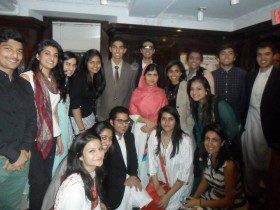 The South Asia Institute supports a number of student organizations at Harvard through grants for programming on issues relevant to South Asia, including the Harvard College Pakistan Student Association, which is hosting a conference at Harvard in April on economic issues related to Pakistan.
The South Asia Institute supports a number of student organizations at Harvard through grants for programming on issues relevant to South Asia, including the Harvard College Pakistan Student Association, which is hosting a conference at Harvard in April on economic issues related to Pakistan.
The Harvard College Pakistan Weekend (HCPW) on April 19th and 20th, 2014 is a conference that aims to mold the international narrative about Pakistan by providing an opportunity for students, academics, practitioners and community members to gather in discussion of Pakistan’s future. In particular, they believe there is a dearth of debate regarding Pakistan’s economic potential. For this very reason, the pioneering edition of HCPW is titled “Ensuring Economic Progress in the Pakistan of the Future.”
The conference is bringing some high-profile speakers to campus, including keynote addresses from Arif Naqvi, Founder and Group Chief Executive of The Abraaj Group, Humayun Akhtar Khan, Former Commerce Minister of Pakistan, Amjad Janjua, Chief Executive Officer of Pakistan State Oil Company, Shujaat Nadeem, Chairman of Samba Bank, Pakistan, and Asim Khwaja, Professor of Public Policy at Harvard Kennedy School.
Panels include:
Moving Beyond the Energy Crisis
It is estimated that Pakistan has lost 7.0 percent of its GDP due to electricity outage costs. Due to this loss of output, employment has decreased by approximately 1.8 million. Clearly, the energy situation is a crucial aspect of the future of Pakistan’s economy. We bring together researchers and practitioners to discuss what needs to be done in order to mend broken systems and harness Pakistan’s energy potential. At the policy level, what needs to change? Is the current focus on generation well founded or is there more to be gained by improving transmission and distribution? Finally, which options are most realistic for Pakistan and what are the timeframes for those options?
The Public-Private Education Paradigm
Nearly half of Pakistan’s population cannot read or write. According to the UNDP, Pakistan ranks 177th globally in terms of public spending on education. But all is not lost. Across the country, the private sector is filling the void left by the public sector; in 2005, the LEAPS Project reported that one in every three enrolled children were enrolled in a private school. Following the lead of the private sector, the public sector has followed suit with a 37 percent increase in provincial spending on education over the last three years. The question that arises then is what role these two sectors will play in education reform. How can the private sector further pressurize the public sector into action? Can the private sector improve educational outcomes on a large scale? On the public front, does change have to come at the provincial level or is there a dire need for a federal policy? Pakistan’s education challenge is steep, but not insurmountable. If change is brought to the education sector, human capital development will seed Pakistan’s growth story.
Fostering Innovation Through Technology
Pakistan is the untold success story of the technology world. There is a growing movement at the university-level to work on technology focused business ventures. Most importantly, incubators are helping entrepreneurs develop ideas and financing is picking up. But, even though the trends have been promising, Pakistan earns only $2.8 billion per annum from the technology sector, providing approximately 100,000 jobs through the industry. We will hear from our panelists on how reforms in the technology sector can contribute to economic growth in Pakistan. What needs to be done to promote a culture of innovation? How can financing be incentivized and how do we create an ecosystem for technology development? The discussion will shed light on the role technology has to play in shaping the future of Pakistan.
Strengthening Pakistan’s Legal System to Facilitate Growth
Pakistan’s legal system receives a lot of criticism. Poor law and order is often cited as a deterrent to international investment. We will explore both the law and order angle and the legal system itself as it relates to economic development. How easy is it to do business in Pakistan? Do domestic and international firms have strong legal protection? Privatizations have previously been botched; what legal structure do these require in order to prove successful? More broadly, what impact does the law and order situation have on day-to-day business?

